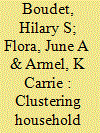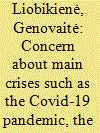|
|
|
Sort Order |
|
|
|
Items / Page
|
|
|
|
|
|
|
| Srl | Item |
| 1 |
ID:
150457


|
|
|
|
|
| Summary/Abstract |
Research on household energy conservation often categorizes targeted behaviours by their behavioural attributes (e.g., savings, cost, frequency). The most common distinction in the literature divides behaviours as follows: (1) low-impact, low-cost, repetitive behaviours that result in a loss of comfort or curtailment behaviours and (2) high-impact, high-cost, infrequent behaviours that result in no loss of amenities or efficiency behaviours. However, such categorizations have often been ad hoc and two-dimensional (e.g., low-impact vs. high-impact, low-cost vs. high-cost). In contrast, we systematically assess a large range of household energy-saving behaviours (N=261) across nine attributes – energy savings, cost, frequency of performance, required skill level, observability, locus of decision, household function, home topography, and appliance topography. By clustering behaviours according to these attributes, we discern four clusters of energy-saving behaviours: family style, call an expert, household management and weekend project. We discuss the implications of these clusters for intervention design.
|
|
|
|
|
|
|
|
|
|
|
|
|
|
|
|
| 2 |
ID:
191387


|
|
|
|
|
| Summary/Abstract |
The number of crises experienced around the world forces people to reconsider and reassess various aspects of their lives. The energy crisis caused by the war in Ukraine and uncontrolled climate change revealed the importance of energy-saving behavior. Thus, the aim of this paper is to analyze the concerns about current crises such as the Covid-19 pandemic, the war in Ukraine, and climate change's impact on energy-saving behavior and changes in environmental concern. Referring to the survey conducted in Lithuania in 2022, where 1000 respondents participated, the results revealed that the war in Ukraine was the most concerning problem. The level of climate change concern was slightly lower. Meanwhile, the Covid-19 pandemic was the least important problem in Lithuania in 2022. Furthermore, respondents stated that the Covid-19 pandemic contributed to the changes in environmental concern and energy-saving actions more than the war in Ukraine did. Meanwhile, the Generalized Linear Model results revealed that only the war in Ukraine positively and significantly influenced energy-saving behavior. The Covid-19 pandemic concern negatively affected energy-saving behavior, while the climate change concern factor affected it indirectly, as the interaction of attitudes toward energy consumption. Thus, this study revealed the main aspect of and how to encourage energy-saving behavior in the context of the main current crises.
|
|
|
|
|
|
|
|
|
|
|
|
|
|
|
|
|
|
|
|
|